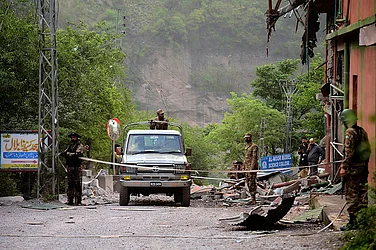Indian stock markets opened with heightened volatility on Wednesday morning after the government announced a series of retaliatory missile strikes on terror camps located in Pakistan and Pakistan-Occupied Kashmir. The strikes, carried out under Operation Sindoor, targeted nine sites, including alleged bases of Jaish-e-Mohammad and Lashkar-e-Taiba, in response to the recent deadly terror attack in Pahalgam.
Despite the gravity of the geopolitical escalation, markets opened at record-breaking levels. According to the Press Trust of India, the Sensex fluctuated between 79,937.48 and 80,844.63 in early trade, while the Nifty ranged between 24,220 and 24,449.60. By 9:42 AM, Nifty was up 23 points to 24,402.80, and Sensex rose 97 points to 80,738.15.
Analysts cited by The Times of India described the investor response as paradoxical but noted that the measured, predictable nature of the strikes helped contain panic. Experts said the absence of immediate escalatory rhetoric from either side contributed to the market라이브 바카라 relative stability.
APR Vik Vet of Geojit Financial Services was quoted as saying the situation reflected a “strident lack of seizure in regional volatility.”
A Business Standard report warned that a prolonged military standoff or escalation could still destabilise markets. However, if tensions remain contained, analysts predict a potential rebound in upcoming sessions.
This dramatic turn of events temporarily paused a 15-session rally in Indian equities. Some market watchers, such as Ajit Bagga, advised caution, warning that prolonged combat scenarios could undermine investor confidence. Meanwhile, Shrikant Chouhan of Kotak Securities suggested that tactical market swings could persist and potentially strengthen in the days ahead.














